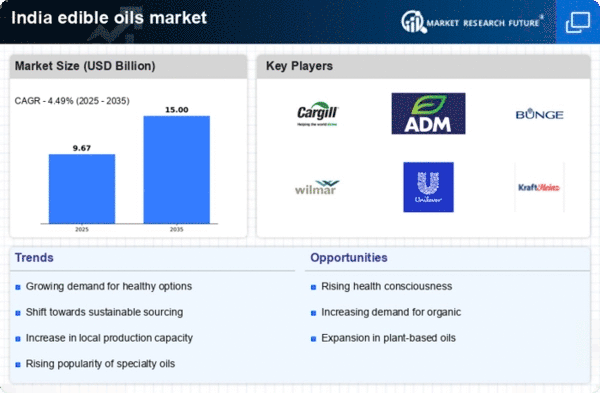Increasing Health Awareness
The growing awareness regarding health and nutrition among consumers is a pivotal driver for the edible oils-fats market. As individuals become more conscious of their dietary choices, there is a noticeable shift towards healthier oil options. This trend is reflected in the rising demand for oils with lower saturated fat content and higher levels of unsaturated fats. For instance, the consumption of oils such as olive and canola has surged, with market data indicating a growth rate of approximately 15% in the last year alone. This shift is likely to continue, as consumers increasingly seek oils that contribute to heart health and overall well-being, thereby influencing the dynamics of the edible oils-fats market. The industry must adapt to these changing preferences to remain competitive and relevant.
Government Regulations and Support
Government regulations and support play a vital role in shaping the edible oils-fats market. Policies aimed at promoting domestic production and reducing dependency on imports are increasingly being implemented. For instance, the Indian government has introduced initiatives to boost local oilseed cultivation, which is expected to enhance the supply chain and stabilize prices. Recent data indicates that domestic production of edible oils has increased by 12% due to these supportive measures. Such regulations not only foster growth within the industry but also encourage investment in local processing facilities. As the government continues to prioritize self-sufficiency in edible oil production, the market is likely to experience sustained growth and development.
Rising Demand for Sustainable Practices
Sustainability has emerged as a crucial factor influencing the edible oils-fats market. Consumers are increasingly favoring products that are produced through environmentally friendly practices. This trend is evident in the growing popularity of oils derived from sustainable sources, such as palm oil certified by the Roundtable on Sustainable Palm Oil (RSPO). Market data suggests that the demand for sustainably sourced oils has increased by approximately 20% over the past year. As consumers become more environmentally conscious, the edible oils-fats market must align with these values to attract a broader customer base. Companies that prioritize sustainability in their production processes are likely to gain a competitive edge, as they resonate with the ethical considerations of modern consumers.
Evolving Culinary Trends and Preferences
Culinary trends and consumer preferences are evolving, significantly impacting the edible oils-fats market. The rise of diverse cuisines and cooking styles has led to an increased demand for a variety of oils, including specialty oils like avocado and sesame. Market data shows that the consumption of these oils has grown by approximately 18% in the last year, reflecting a shift in cooking habits. Additionally, the trend towards home cooking and experimentation with flavors has further fueled this demand. As consumers seek to enhance their culinary experiences, the edible oils-fats market must adapt to these changing preferences by offering a wider range of products. This adaptability is crucial for capturing the interest of modern consumers.
Technological Advancements in Oil Extraction
Technological innovations in oil extraction processes are significantly impacting the edible oils-fats market. Advances such as cold-pressing and solvent extraction have improved the efficiency and quality of oil production. These technologies not only enhance yield but also preserve the nutritional value of oils, catering to the health-conscious consumer segment. For example, the introduction of advanced refining techniques has led to a 10% increase in the yield of high-quality oils. As these technologies continue to evolve, they are expected to drive further growth in the market, enabling producers to meet the rising demand for premium edible oils. The industry must stay abreast of these advancements to optimize production and maintain competitiveness.

















Leave a Comment